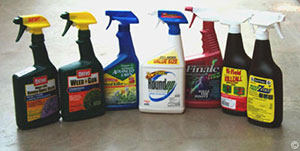
What is a good control for weeds?
The best control for weeds is a healthy landscape with limited bare soil as this will effectively reduce future weed problems. When combating an existing weed problem there are several possible approaches including cultural and chemical controls.
What are good cultural weed controls?
Cultural weed control methods include: mulching, mowing, hand-weeding, and cultivation. Mulching suppresses annual weeds by limiting light required for weed establishment, ensure at least 3 inches of mulch for effective control. Mowing is a helpful method to limit seed production. Mowing must be done when flower heads are produced around April for winter annuals and in summer for summer annuals. Frequent hand removal of annual weeds is a time consuming but effective tool if done before flowering. Hand removal of perennials has a limited effect. Often a large part of the root remains in the soil and will quickly regenerate a top although persistence can weaken a plant over time if numbers are small. Cultivation will break up a plant above and below the soil surface. This is very effective for some species, but others that can reproduce from small parts of a root or stem will bounce back without secondary measures.
What should I consider before using chemical products?
Before using any chemical product, correctly identify the weed and read the product label. Pre-emergent herbicides are used primarily to control grassy weeds like crabgrass before they germinate. Apply two to four weeks before the plant emerges. Postemergent herbicides kill weeds present at the time of application. Weeds must be actively growing when the herbicides are applied. Selective, systemic, postemergent herbicides such as 2,4-D, and dicamba offer broadleaf weed control without harming lawngrass. Some, like glyphosate are non-selective and systemic, killing any plant contacted. Others, like diquat, are non-systemic or contact herbicides, killing only plant parts contacted by the herbicide. Contact herbicides are effective against annual weeds but only “burn off” the tops of perennial weeds, chemically mowing them. Many organic herbicides are contact herbicides and therefore frequent reapplication through the season may be necessary.
Because weeds are opportunists, be sure to encourage quick growth of turfgrass or ornamental plants soon after treatment. Otherwise, new weeds will quickly reinfest the area.
For more information, see the following Colorado State University Extension fact sheet(s).
For more information, see the following Planttalk Colorado™ script(s).



